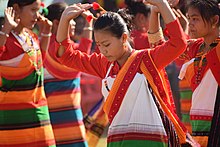This article has multiple issues. Please help improve it or discuss these issues on the talk page. (Learn how and when to remove these messages)
|
Dimasa | |
|---|---|
 Barman Dimasa girl while performing Baidima, the traditional dance of Dimasa. | |
| Total population | |
| 262,413 (2011 Census) | |
| Regions with significant populations | |
| 142,961 (2011, Dimasa-Kachari,in hill districts of Assam only)[1] | |
| Languages | |
| Dimasa | |
| Religion | |
| Hinduism and traditional faith (Daikhos/Dimasa religion (Animism/Shamanism) [2] For more details, see Religion | |
| Related ethnic groups | |
| other Tibeto-Burman peoples (Chakma people, Naga, Chin, Jinpho, Tripuri, Bamar) | |
| Part of a series on the |
| Culture of Assam |
|---|
 |
The Dimasa people or Dimasa Kachari people (local pronunciation: [dimāsā]) are an ethnolinguistic community presently inhabiting in Assam and Nagaland states in Northeastern India. They speak Dimasa, a Tibeto-Burman language. This community is fairly homogeneous and exclusive, with members required to draw from both parents' separate clans. Dimasa kingdom, one of many early states in Assam following the downfall of Kamarupa kingdom, was established by these people.[6]
The Dimasas are one of the oldest inhabitants of the Northeastern part of India and is one of the many Kachari tribes.
Kacharis appear to be one of the earliest indigenous ethnic groups of northeastern India. They are a part of the greater Bodo-Kachari family of ethnolinguistic groups of Northeast India which includes Boro, Tripuri, Rabha, Garo, Tiwa, Koch, Moran etc. peoples of northeast india. They speak Dimasa language a Boro-Garo language of the Tibeto-Burman family.
- ^ "ST-14 Scheduled Tribe Population By Religious Community - Assam". census.gov.in. Retrieved 29 February 2020.
- ^ "Daikhos of Dimasas: The Regional Form of Practice and Dharma".
- ^ "639 Identifier Documentation: aho – ISO 639-3". SIL International (formerly known as the Summer Institute of Linguistics). SIL International. Retrieved 29 June 2019.
Ahom [aho]
- ^ "Population by Religious Communities". Census India – 2001. Ministry of Home Affairs, Government of India. Retrieved 1 July 2019.
Census Data Finder/C Series/Population by Religious Communities
- ^ "Population by religion community – 2011". Census of India, 2011. The Registrar General & Census Commissioner, India. Archived from the original on 25 August 2015.
2011census/C-01/DDW00C-01 MDDS.XLS
- ^ "Another local kingdom ... was that of the Dimasas in the north Cachar hills. They were known to the Ahoms as Timisa, clearly a corruption of Dimasa..." (Shin 2020:61)